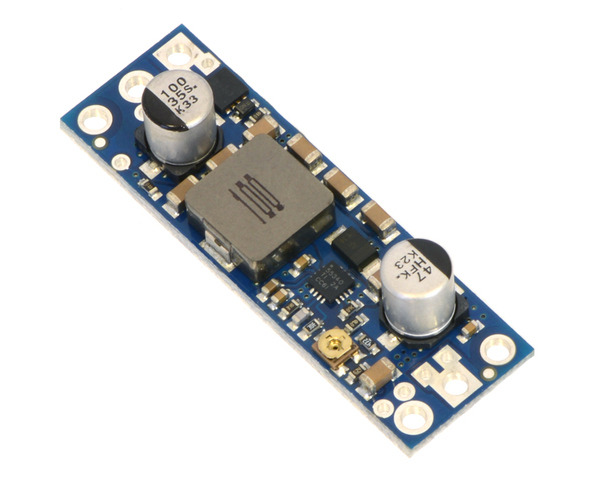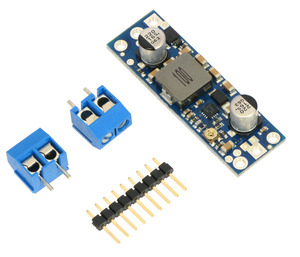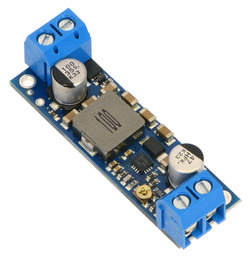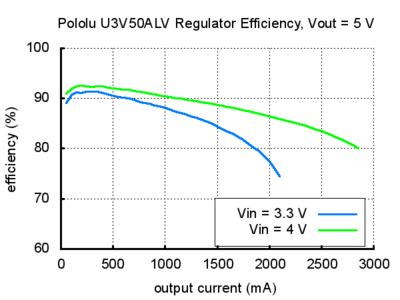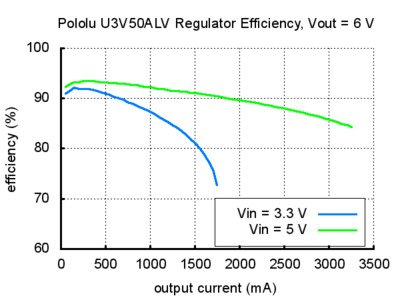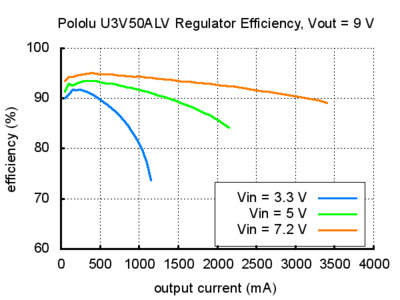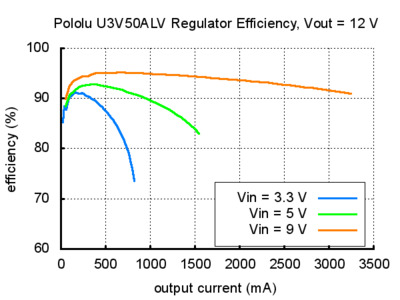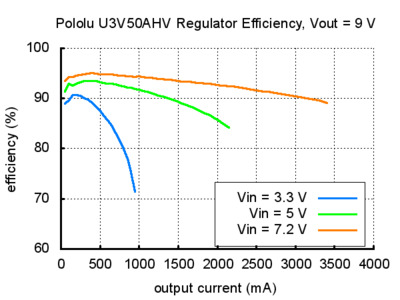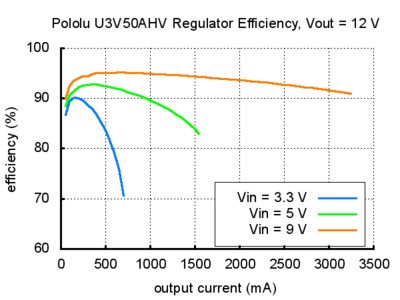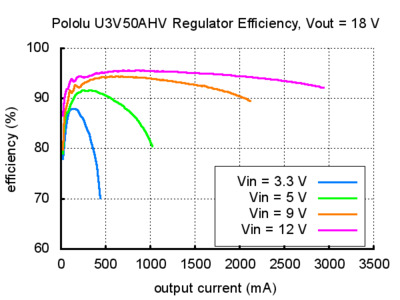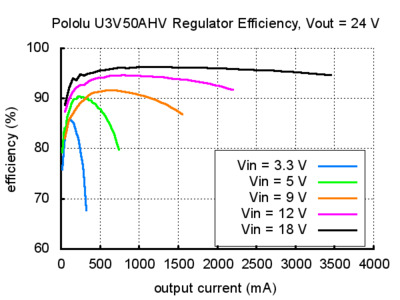Voltage Regulators and Power Supplies » Step-Up (Boost) Voltage Regulators » U3V50x Step-Up Voltage Regulators »
Pololu Adjustable 9-30V Step-Up Voltage Regulator U3V50AHV
| Output voltage | Typical max input current* | Min input voltage |
|---|---|---|
| 9 V – 30 V | 5 A | 2.9 V |
*Actual achievable maximum continuous current is a function of input voltage and is limited by thermal dissipation.
Alternatives available with variations in these parameter(s): maximum output voltage Select variant…
| Description | Specs (11) | Pictures (16) | Resources (3) | FAQs (0) | On the blog (1) | Distributors (31) |
|---|
Note: We recommend our newer U3V70x family of boost regulators over these older U3V50x regulators for applications that require 20 V or less. The U3V70x regulators are smaller and can deliver more current, and the adjustable version features a precision 11-turn potentiometer, which makes it easier to set the output voltage to a particular value.
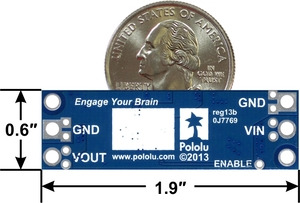 |
Overview
These adjustable boost (step-up) voltage regulators generate higher output voltages from input voltages as low as 2.9 V. They are switching regulators (also called switched-mode power supplies (SMPS) or DC-to-DC converters) and have a typical efficiency between 80% to 95%. The available output current is a function of the input voltage, output voltage, and efficiency (see the Typical Efficiency and Output Current section below), but the input current can typically be as high as 5 A. The U3V50x regulator family includes two adjustable-output versions: the U3V50ALV offers an output range of 4 V to 12 V and the U3V50AHV offers an output range of 9 V to 30 V. Versions of this regulator are also available with a fixed 5 V, 6 V, 9 V, 12 V, or 24 V output:
Alternatives available with variations in these parameter(s): output voltage Select variant…
The different versions of the board all look very similar, so the bottom silkscreen includes a blank space where you can add your own distinguishing marks or labels.
The no-load quiescent current depends on the difference between the input and the output voltage. When the two are close, the quiescent current can be less then a milliamp (e.g. 0.6 mA with 5 V in and 6 V out); when the two are far apart, it might be in the tens of milliamps (e.g. 24 mA with 3 V in and 24 V out).
This regulator has built-in reverse-voltage protection, over-current protection, thermal shutdown (which typically activates at 165°C), and an under-voltage lockout that causes the regulator to turn off when the input voltage is below 2.5 V (typical).
Features
- Input voltage: 2.9 V to VOUT
- Output adjustable from 4 V to 12 V or 9 V to 30 V
- 5 A switch allows for input currents up to 5 A
- Integrated reverse-voltage protection, over-current protection, over-temperature shutoff, and under-voltage lockout
- Typical efficiency of 80% to 95%, depending on input voltage, output voltage, and load
- Compact size: 1.9″ × 0.6″ × 0.41″ (48 × 15 × 10.5 mm)
- Two mounting holes for #2 or M2 screws
- Smaller holes for 0.1″ header pins and larger holes for terminal blocks offer several options for connecting to the board
Using the regulator
Connections
This boost regulator has four connections: input voltage (VIN), ground (GND), and output voltage (VOUT), and ENABLE.
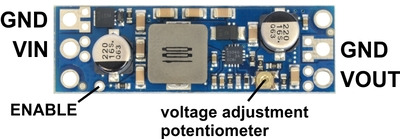 |
The input voltage, VIN, must be at least 2.9 V and should not exceed the output voltage, VOUT. (If VIN is higher than VOUT, the higher input voltage will show up on the output, which is potentially dangerous for your connected load and could also damage the regulator.)
The regulator is enabled by default: a 100 kΩ pull-up resistor on the board connects the ENABLE pin to reverse-protected VIN. The ENABLE pin can be driven low (under 0.7 V) to put the board into a low-power state. The quiescent current draw in this sleep mode is dominated by the current in the pull-up resistor from ENABLE to VIN and by the reverse-voltage protection circuit, which will draw between 10 µA and 20 µA per volt on VIN when ENABLE is held low. If you do not need this feature, you should leave the ENABLE pin disconnected. Note that like most boost regulators, the input power will pass through to the output when the board is disabled, so the ENABLE pin cannot be used to turn off power to the load.
The connections are labeled on the back side of the PCB, and the board offers several options for making electrical connections. The eight smaller through-holes on the ends of the board are arranged with a 0.1″ spacing for compatibility with solderless breadboards, connectors, and other prototyping arrangements that use a 0.1″ grid; you can solder pieces of the included 9×1 straight male header strip into these smaller holes. Alternatively, you can solder the included 2-pin 5mm-pitch terminal blocks to the two pairs of larger holes on the ends of the board. For the most compact installation, you can solder wires directly to the board.
Note that this regulator has a thick PCB (0.093″), so terminal block and header pins will not protrude as far through the holes as they would with typical 0.062″-thick PCBs.
 |
Pololu step-up voltage regulator U3V50x with included terminal blocks installed, side view. |
|---|
The board has two mounting holes intended for #2 or M2 screws. The mounting holes are at opposite corners of the board, separated by 1.7″ horizontally and 0.4″ vertically.
Setting the output voltage
The output voltage can be adjusted using a multimeter and a light load (e.g. a 10 kΩ to 100 kΩ resistor). Turning the potentiometer clockwise increases the output voltage. The output voltage can be affected by a screwdriver touching the potentiometer, so the output measurement should be done with nothing touching the potentiometer (also, note that touching parts of the board with your finger can affect the output voltage).
Warning: You should be careful not to use an input voltage that exceeds the output voltage setting, so we recommend setting the output voltage with an input voltage that is below anything in the possible output range. Note that the potentiometer has no physical end stops, which means that the wiper can be turned 360 degrees and into an invalid region in which the output voltage is set to approximately 3.9 V for the U3V50ALV and 8.3 V for the U3V50AHV. We do not ship these with any particular default voltage setting.
The following graph shows the approximate output voltage as a function of the potentiometer position:
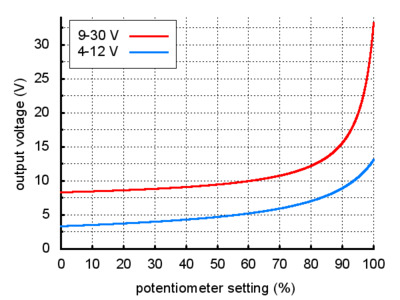 |
Output voltage settings for Pololu adjustable step-up voltage regulators U3V50ALV (blue line) and U3V50AHV (red line). |
|---|
The absolute limit for the input voltage is approximately double the output voltage setting. For example, if the output is set to 10 V, exceeding 20 V on the input could permanently damage the regulator. Once the input exceeds the output set point, the output voltage will rise with the input voltage since the input is connected to the output through an inductor and a diode.
Note: The trimmer potentiometer is not rated for continual adjustment back and forth; the intended application is to set the output voltage a few times in its life.
Typical efficiency and output current
The efficiency of a voltage regulator, defined as (Power out)/(Power in), is an important measure of its performance, especially when battery life or heat are concerns. As shown in the graphs below, these switching regulators have an efficiency of 80% to 95% for most combinations of input voltage, output voltage, and load.
U3V50ALV (4-12 V) efficiencies for various combinations of VIN and VOUT:
U3V50AHV (9-30 V) efficiencies for various combinations of VIN and VOUT:
The maximum achievable output current is approximately proportional to the ratio of the input voltage to the output voltage. If the input current exceeds the 5 A switch current limit, the output voltage will begin to drop. Additionally, the maximum output current can depend on other factors, including the ambient temperature, air flow, and heat sinking.
During normal operation, this product can get hot enough to burn you. Take care when handling this product or other components connected to it.
